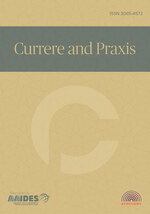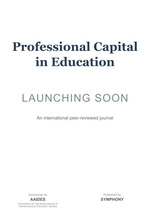Impacts of K-12 emergency online teaching within a rural, rural-remote context: Finding value in the experience
DOI:
https://doi.org/10.70116/2980274181Keywords:
Emergency online teaching, pandemic teaching, K-12 online instructionAbstract
Exploratory, convergent mixed methods research was used to examine the shifts in rural/rural-remote K-12 teachers' (n=40) perspectives and experiences of emergency online teaching (EOT), including perceptions of value before and after the EOT phase of the recent COVID-19 pandemic. The sample came from one highly rural state (64.9% rural population) in the western United States. Data were collected using a Likert-like survey along with a set of open-ended questions. Descriptive statistics and a t-test were used to examine survey data while thematic analysis of the participants’ narratives was used to identify themes within the open-ended data. A substantial increase in knowledge was reported post-EOT, and statistical analysis confirmed significant gains in perceived knowledge of and confidence with online instruction (t (39) = 8.2041, p ≤ 0.001) within the sample. Findings suggest that participants’ self-efficacy with online teaching improved because of their EOT experiences. Results also suggest the experience had value beyond the pandemic years, with participants reporting perceptions of slight to moderate value, including ongoing value for enhancing teaching and value for learning along with perceptions of self-efficacy and adaptability in times of future crisis. Within the qualitative data, both prominent challenges, such as student engagement, and successes, such as teacher adaptability and resilience, emerged. Recommendations along with consideration of the implications for teacher educators, rural policy makers, and other stakeholders interested in determining the long-term benefits and challenges of the emergency online teaching experience on teachers and their professional practice are examined as well.
Downloads
References
Abbasnejad, B., Soltani, S., & Wong, P. (2024). A systematic review of online learning and teaching strategies during the COVID-19 pandemic: Implications for the construction management sector. Smart and Sustainable Built Environment, 13(4), 934–959. DOI: https://doi.org/10.1108/SASBE-08-2022-0174
Archambault, L., & Crippen, K. (2009). Examining TPACK among K–12 online distance educators in the United States. Contemporary Issues in Technology and Teacher Education, 9(1), 71–88.
Archambault, L. M., & Barnett, J. H. (2010). Revisiting technological pedagogical content knowledge: Exploring the TPACK framework. Computers & Education, 55(4), 1656–1662. DOI: https://doi.org/10.1016/j.compedu.2010.07.009
Azizi, Y., Hession, J., & Newpher, T. (2023). Comparing student performance in emergency remote and face-to-face collaborative learning courses. Journal of Undergraduate Neuroscience Education, 22(2), A117–A125. DOI: https://doi.org/10.59390/AXNC2524
Barbour, M. K., & Hodges, C. B. (2024). Preparing teachers to teach online: A critical issue for teacher education. Journal of Technology and Teacher Education, 32(1), 5–27. DOI: https://doi.org/10.70725/394261afynbl
Bonk, R. J., Kefalaki, M., Rudolph, J., Diamantidaki, F., Rekar Munro, C., Karanicolas, S., & Pogner, K. H. (2020). Pedagogy in the time of pandemic: From localization to globalization. Journal of Education, Innovation, and Communication, 3, 17–64. DOI: https://doi.org/10.34097/jeicom_SP_june2020_1
Botvin, M., Hershkovitz, A., & Forkosh-Baruch, A. (2023). Data-driven decision-making in emergency remote teaching. Education and Information Technologies, 28(1), 489–506. DOI: https://doi.org/10.1007/s10639-022-11176-4
Braun, V., & Clarke, V. (2006). Using thematic analysis in psychology. Qualitative Research in Psychology, 3(2), 77–101. DOI: https://doi.org/10.1191/1478088706qp063oa
Cavanaugh, C., Gillan, K. J., Kromrey, J., Hess, M., & Blomeyer, R. (2004). The effects of distance education on K-12 student outcomes: A meta-analysis. Learning Point Associates/North Central Regional Educational Laboratory (NCREL).
Chaudhuri, P. (2022). Moving to emergency remote teaching: How teachers and students navigated the shift to online teaching and learning during the COVID-19 pandemic. Distance Learning, 19(2), 55–100.
Chiu, T. K. F. (2021). Student engagement in K-12 online learning amid COVID-19: A qualitative approach from a self-determination theory perspective. Interactive Learning Environments, 31(6), 3326–3339. https://doi.org/10.1080/10494820.2021.1926289 DOI: https://doi.org/10.1080/10494820.2021.1926289
Crompton, H., & Burke, D. (2024). The nexus of ISTE standards and academic progress: A mapping analysis of empirical studies. TechTrends, 68(4), 711–722. DOI: https://doi.org/10.1007/s11528-024-00973-y
De Voto, C., & Superfine, B. M. (2023). The crisis you can’t plan for: K-12 leader responses and organizational preparedness during COVID-19. School Leadership & Management, 1–21. DOI: https://doi.org/10.1080/13632434.2023.2171003
Donahue, D. M. (2023). Teacher experiences during COVID, their perceptions of morale, and influential school support (Doctoral dissertation, The Florida State University).
Ferri, F., Grifoni, P., & Guzzo, T. (2020). Online learning and emergency remote teaching: Opportunities and challenges in emergency situations. Societies, 10(4), 86. DOI: https://doi.org/10.3390/soc10040086
Fox, E. (2024). Novice K-12 online teacher support. Journal of Online Learning Research, 10(1), 15–48.
Gómez-Domínguez, V., Gómez-Domínguez, M., Navarro-Mateu, D., & Tébar-Yébana, S. (2024, November). How did educational institutions respond to students with special needs during COVID-19: Considerations for policy? Frontiers in Education, 9, 1451597. DOI: https://doi.org/10.3389/feduc.2024.1451597
Hodges, C., Moore, S., Lockee, B., Trust, T., & Bond, A. (2020). The difference between emergency remote teaching and online learning. Educause Review, 27(1), 1–9.
Hurtt, A., Reed, S., Dykeman, K., & Luu, J. (2025). Ensuring educational continuity in the midst of crisis: Policy and planning during the COVID-19 pandemic. Educational Policy, 39(2), 279–323. DOI: https://doi.org/10.1177/08959048231215488
Ingram, K. D. (2024). K-12 teachers’ experiences with facilitating student-content engagement in blended learning environments (Doctoral dissertation, The University of North Carolina at Charlotte).
Jeffery, K. A., & Bauer, C. F. (2020). Students’ responses to emergency remote online teaching reveal critical factors for all teaching. Journal of Chemical Education, 97(9), 2472–2485. DOI: https://doi.org/10.1021/acs.jchemed.0c00736
Johnson, C. C., Walton, J. B., Strickler, L., & Elliott, J. B. (2023). Online teaching in K-12 education in the United States: A systematic review. Review of Educational Research, 93(3), 353–411. DOI: https://doi.org/10.3102/00346543221105550
Kocagül, M., & Çoban, G. Ü. (2024). Evaluation of pre-service Science and Math teachers’ online teaching experiences within the TPACK framework. Journal of Educational Technology and Online Learning, 7(2), 149–167. DOI: https://doi.org/10.31681/jetol.1332419
Kormos, E. M. (2018). The unseen digital divide: Urban, suburban, and rural teacher use and perceptions of web-based classroom technologies. Interdisciplinary Journal of Practice, Theory, and Applied Research, 35(1), 19–31. https://doi.org/10.1080/07380569.2018.1429168 DOI: https://doi.org/10.1080/07380569.2018.1429168
Lee, M. H., & Tsai, C. C. (2010). Exploring teachers’ perceived self-efficacy and technological pedagogical content knowledge with respect to educational use of the World Wide Web. Instructional Science, 38, 1–12. DOI: https://doi.org/10.1007/s11251-008-9075-4
Lima, J. P., Sá, S., Pascoinho, J., Costa, E., Torres, J., & da Rocha, M. T. (2023). The impact of remote teaching in teachers’ motivation: In time pandemic COVID-19. In Abreu, A., Carvalho, J. V., Liberato, D., & Galdames, I. S. (Eds.), Advances in Tourism, Technology and Systems. Smart Innovation, Systems and Technologies, vol. 340 (pp. 117–131). Springer, Singapore. https://doi.org/10.1007/978-981-19-9960-4_11 DOI: https://doi.org/10.1007/978-981-19-9960-4_11
Low, E. L. (2024). Rethinking teacher education in pandemic times and beyond. Educational Research for Policy and Practice, 23(3), 395-406. DOI: https://doi.org/10.1007/s10671-023-09337-4
Macias, J. J. (2023). Online instructional preparedness of K-12 teachers: A look at professional development using social media in a global pandemic (Doctoral dissertation, Alliant International University).
Marshall, D. T., Smith, N. E., Love, S. M., Neugebauer, N. M., & Shannon, D. M. (2024). “At some point we're going to reach our limit”: Understanding COVID‐19's impact on teacher burnout and subjective mental health. Psychology in the Schools, 61(3), 793-812. DOI: https://doi.org/10.1002/pits.23084
Mishra, P., & Koehler, M. J. (2006). Technological pedagogical content knowledge: A framework for teacher knowledge. Teachers College Record, 108(6), 1017–1054. DOI: https://doi.org/10.1177/016146810610800610
Misirli, O., & Ergulec, F. (2021). Emergency remote teaching during the COVID-19 pandemic: Parents' experiences and perspectives. Education and Information Technologies, 26(6), 6699-6718. DOI: https://doi.org/10.1007/s10639-021-10520-4
Ott, C. D. (2024). “Normal wasn’t always productive or helpful”: Teachers of color authentically caring for the humanities of Black, Indigenous, and students of color during the COVID-19 pandemic. International Journal of Qualitative Studies in Education, 37(8), 2345-2360. DOI: https://doi.org/10.1080/09518398.2024.2318278
Pamuk, S. (2012). Understanding preservice teachers' technology use through TPACK framework. Journal of Computer Assisted Learning, 28(5), 425-439. DOI: https://doi.org/10.1111/j.1365-2729.2011.00447.x
Peters, S. J., Langi, M., Kuhfeld, M., & Lewis, K. (2025). Unequal learning loss: How the COVID-19 pandemic influenced the academic growth of learners at the tails of the achievement distribution. Journal for the Education of the Gifted, 48(1), 25-47. DOI: https://doi.org/10.1177/01623532241301079
Procentese, F., Gatti, F., & Ceglie, E. (2023). Protective and risk social dimensions of emergency remote teaching during COVID‐19 pandemic: A multiple mediation study. Journal of Community Psychology, 51(1), 67-83. DOI: https://doi.org/10.1002/jcop.22879
Radloff, J., Fantacone, D., Yeter, I. H., & Pagano, A. (2024). Exploring secondary master STEM teachers’ tensions with transitioning to emergency remote teaching. Technology, Knowledge and Learning, 29(2), 997-1018. DOI: https://doi.org/10.1007/s10758-023-09717-y
Ray, B. (2023, April). Use of Twitter as a dispositional tool for teachers during the shift to emergency remote learning. Applying Education: Teaching and Learning Conference. Architecture, Media, Politics, and Society Research Organization.
Ray, B., & Hocutt, M. (2016). Learning from and teaching about disaster: The case of the April 2011 tornado outbreak. American Secondary Education, 44(3), 66-84.
Ray, B., & Ntuli, E. (2022, April). Teachers’ experiences during the early pandemic years: Twitter has a role to play in telling the story. In Society for Information Technology & Teacher Education International Conference (pp. 1164-1170). Association for the Advancement of Computing in Education (AACE).
Regalado, J. (2025). Lived experiences of high school teachers' professional development post-COVID-19 pandemic in rural Georgia: A transcendental phenomenology study (Doctoral dissertation, Liberty University).
Rippé, C. B., Weisfeld-Spolter, S., Yurova, Y., & Kemp, A. (2021). Pandemic pedagogy for the new normal: Fostering perceived control during COVID-19. Journal of Marketing Education, 43(2), 260-276. DOI: https://doi.org/10.1177/0273475320987287
Schmid, M., Brianza, E., Mok, S. Y., & Petko, D. (2024). Running in circles: A systematic review of reviews on technological pedagogical content knowledge (TPACK). Computers & Education, 105, 105024. DOI: https://doi.org/10.1016/j.compedu.2024.105024
Schuck, R. K., & Lambert, R. (2020). “Am I doing enough?” Special educators’ experiences with emergency remote teaching in Spring 2020. Education Sciences, 10(11), 320. DOI: https://doi.org/10.3390/educsci10110320
Testa, G. M. G., de Oliveira Souza, M. B., Paes, Â. T., & Magdalon, J. (2023). Use of active learning during emergency remote teaching in COVID-19 pandemic. Medical Science Educator, 33(4), 913-924. DOI: https://doi.org/10.1007/s40670-023-01816-w
Trust, T., & Whalen, J. (2020). Should teachers be trained in emergency remote teaching? Lessons learned from the COVID-19 pandemic. Journal of Technology and Teacher Education, 28(2), 189-199. DOI: https://doi.org/10.70725/307718pkpjuu
Wang, X., Young, G. W., Iqbal, M. Z., & Guckin, C. M. (2024). The potential of extended reality in rural education’s future–Perspectives from rural educators. Education and Information Technologies, 29(7), 8987-9011. DOI: https://doi.org/10.1007/s10639-023-12169-7
Wharton-Beck, A., Chou, C. C., Gilbert, C., Johnson, B., & Beck, M. A. (2024). K-12 school leadership perspectives from the COVID-19 pandemic. Policy Futures in Education, 22(1), 21-42. DOI: https://doi.org/10.1177/14782103221135620
Whittle, C., Tiwari, S., Yan, S., & Williams, J. (2020). Emergency remote teaching environment: A conceptual framework for responsive online teaching in crises. Information and Learning Sciences, 121(5/6), 311-319. DOI: https://doi.org/10.1108/ILS-04-2020-0099
Yang, H., Kim, J., Kelly, S., & Goke, R. (2024). The virtual classroom divide: How does the self-efficacy gap reshape online learning? Communication Education, 73(3), 267-281. DOI: https://doi.org/10.1080/03634523.2024.2347206
Downloads
Published
How to Cite
Issue
Section
License
Copyright (c) 2025 Symphony

This work is licensed under a Creative Commons Attribution 4.0 International License.














